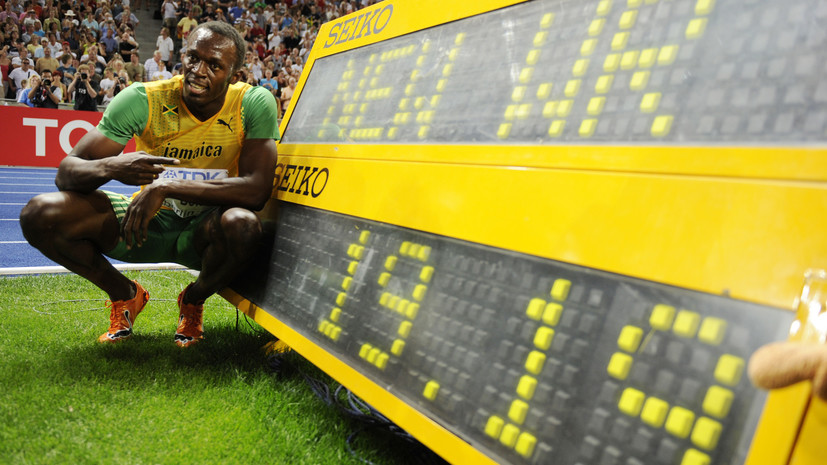In August 2008, Usain Bolt once and for all became the legend of athletics. At the Olympic Games in Beijing, he won three gold medals in the 100 and 200 meter runs, as well as in the 4 × 100 meter relay race (this result was subsequently canceled due to dope found at his partner Nesta Carter). In each race, the Jamaican beat world records, which made him a star for many years to come.
Specialists were amazed - how did an athlete with such a technique and attitude towards running generally come close to world achievements? The finish line was especially indicative. Bolt, not believing his happiness, even before crossing the line began to look around and shrug. And this did not stop the Jamaican from improving its May achievement for three hundredths of a second, with which the wind helped it pretty much.
Then in Beijing, Bolt didn’t just run faster than anyone else in history. He also showed what a huge potential is hidden in it. A year later, at a world championship in Berlin, a rather young 22-year-old athlete had to prove that his world records were not the limit for him.
Preparation for those competitions turned out to be crumpled. In the spring, Bolt had a car accident and injured his leg. He even needed an emergency operation. The athlete quickly recovered, but so far he was not close to his Beijing indicators. Meanwhile, American Tyson Gay gradually caught up with the 100-meter world record - before the World Cup, he ran the distance in 9.77 seconds, losing only eight hundredths to the result of Bolt.
August 16, 2009 hosted the first final with Bolt. He had to run 100 meters in the company of the strongest sprinters, who would no longer allow him to celebrate victory early.
This time, the Jamaican brought together all the factors that could help improve the result. His reaction time was 0.146 seconds - not perfect compared to other participants, but better than it was at the Olympics. Over the year, Bolt increased the length of his stride - the young body could still work on it. There was no longer a relaxed finish; the Olympic champion worked until the very end, although he did not “dive” the hull under the line. In addition, the wind helped Bolt - in Berlin it was fair and amounted to 0.9 meters per second, and in Beijing there was calm.
As a result, the Jamaican stopped the stopwatch at around 9.58 seconds. More accurate electronics showed that the race lasted 9.572 seconds, but the official world record was rounded up. That night, Bolt rewrote the story again, but in the very first interview after the race he noticed that the record could be reduced to 9.4 seconds.
The uniqueness of the new achievement was added by how much it was improved. From the previous reference point he “cut off” 11 hundredths of a second. For a 100-meter run, such a drop is uncharacteristic - in the era of manual timing, sprinters gradually improved the record by one tenth, and after the introduction of automation, only hundredths. Before Bolt, Maurice Green made the biggest leap, raising the bar from 9.84 to 9.79 seconds.
The achievements of the fastest man in the world at the World Cup did not end there. Four days later, on August 20, Bolt had to fight for medals in the 200-meter race. Once he considered this discipline to be his main one, and the more popular hundred-meter race in the world entered his arsenal only in 2008.
Bolt's Beijing 200 meter record was 19.30 seconds. There was almost no discussion that this achievement could fall. The Jamaican and so did the impossible, conquering one of the most "obstinate" disciplines. Since 1968, when Tommy Smith first crossed the milestone of 20 seconds, only three athletes managed to set world records, and Bolt was already on this exclusive list.
But the new 100-meter world champion had plans to update another record. Despite the fact that the final 200-meter race started with a false start, Bolt did not “restrain the horses” in the second attempt. The Jamaican reaction time was the best among all participants, and he broke out of the pads faster than ever before. At the turn, Bolt stuck to the left edge, trying to at least a centimeter to reduce his distance before reaching the finish line. There he already with his huge sweeping steps quickly overcame the remaining distance.
This time the stopwatch froze at around 19.20 seconds, and after a couple of minutes the time was adjusted to 19.19 seconds. At the same time, the wind blowing in his face partially interfered with Bolt, and immediately before the finish line he again slightly lost control of himself, having looked at the scoreboard with the results.
A few days later, Bolt won gold in the relay 4 × 100 meters. Then the result of 37.31 seconds was not a world record, but it was recognized as such after years when the result of the Beijing Olympics was canceled. Bolt more than once, together with the Jamaican team, rewrote the achievements in the relay, and the last of them was installed at the Olympic Games in London.
And while running 100 and 200 meters, world records are still standing. Bolt could have progressed further, but the next year there were no big starts, for the sake of which it was necessary to go to a transcendental level. And soon the need to break records completely disappeared. Bolt used to be driven by fierce competition, but gradually it came to naught.
The main superstar of athletics, and so no one bothered to win the gold medals of the Olympic Games and World Championships. Since Bolt became not only the fastest man on earth, but throughout history, ten years have passed, and no one has come close to his records.

